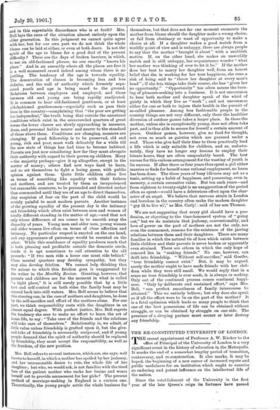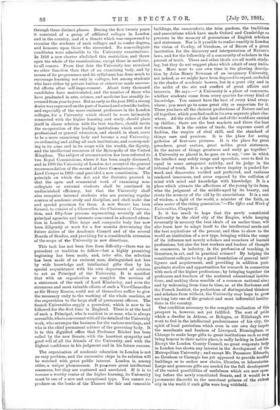THE RE-CONSTITUTED UNIVERSITY OF LONDON.
THE recent appointment of Professor A. W. Rucker to the office of Principal of the University of London is a very significant event in the history of education in the Metropolis. It marks the end of a somewhat lengthy period of transition, controversy, and re-construction. It also marks, it may be hoped, the beginning of a new career of increased repute and public usefulness for an institution which ought to exercise an enduring and potent influence on the intellectual life of the nation.
Since the establishment of the University in the first year of the late Queen's reign its fortunes have passed
through three distinct phases. During the first twenty years it consisted of a group of affiliated colleges in London and in the country, and of a Senate which was empowered to examine the students of such colleges and to confer degrees and honours upon those who succeeded. No non-collegiate canditates were admissible to the University examinations. In 1858 a new charter abolished this restriction, and threw open the whole of the examinations, except those in medicine, to all corners. From that date the University has exercised no other function than that of an examining body, and by means of its programmes and its syllabuses has done much to encourage learning not only in colleges. but among students who have either by private tuition or otherwise made success- ful efforts after self-improvement. About forty thousand candidates have matriculated, and the number of those who have graduated in arts, science, and medicine has steadily in- creased from year to year. But as early as the year 1885 a strong desire was expressed on the part of learned and scientific bodies, and especially of the more eminent professors in the London colleges, for a University which should be more intimately connected with the higher learning and study, should place itself in closer relation with the best teachers, should invite the co-operation of the leading institutions which exist for professional or general education, and should, in short, cease to be a mere examining body and become a real University, co-ordinating and aiding all such institutions, and correspond- ing in its aims and in its scope with the wealth, the dignity, and the intellectual resources of the Metropolis of the United Kingdom The subject of reconstruction has been referred to two Royal Commissions, where it has been amply discussed, and in 1898 the University of London Act accepted the general recommendation of the second of these Commissions—that of Lord Cowper in 1892—and provided a new constitution. The principle on which the Act and the Statutes proceed is that the open and ecumenical work of examining non- collegiate or external students shall be continued in undiminished efficiency, but that the University shall also recognise internal students who are pursuing regular courses of academic study and discipline, and shall make due and special provision for them. A new Senate has been formed, to consist of a Chancellor, the Chairman oZ Convoca- tion, and fifty-four persons representing severally all the principal agencies and interests concerned in advanced educa- tion in London. This large and composite body has now been diligently at work for a few months determining the future duties of the Academic Council and of the several Boards of Studies, and providing for a considerable extension of the scope of the University in new directions.
This task has not been free from 'difficulty—there was no precedent or tradition to follow—but a highly promising beginning has been made, and, inter cilia, the selection has been made of an eminent man, distinguished not less by wide knowledge and intellectual gifts than by his special acquaintance with his own department of science, to act as Principal of the University. It is manifest that with an organisation so complex the services of a statesman of the- rank of Lord Kimberley, and even the strenuous and most valuable efforts of such a Tice-Chancellor as Sir Henry Roscoe, could not of themselves suffice to give the necessary unity to the working of the whole machine, or due supervision to the large staff of permanent officers. The Scotch Universities supply a precedent, which is now to be followed for the first time in England. There is at the head of each a Principal, who is resident in or near, who is always accessible, who is conversant with all the details of the University work, who arranges the business for the various meetings, and who is the chief permanent adviser of the governing body. It is to this dignified office that Professor Riicker has been called by the new Senate, with the heartiest sympathy and good will of all the friends of the University, and with the highest confidence in his judgment and in his future success.
The organisation of academic education in London is not an easy problem, and the successive steps in its solution will be watched with great public interest. London is, among cities, a unique phenomenon. It posyresses great intellectual resources, but they are scattered and unrelated. If it is to become a worthy centre of the higher learning, its University must be one of a new and exceptional type. You cannot re- produce on the banks of the Thames the fair and venerable
buildings, the camaraderie, the trim gardens, the traditions and associations which have made Oxford and Cambridge so precious in the memory of generations of English scholars and statesmen. Nor is it possible to realise exactly in London the vision of Cowley, of Gresham, or of Bacon of a great institution for the discovery and interpretation of Nature's laws, and for the fellowship of a community of scholars in the pursuit of truth. These and other ideals are all worth study. ing, but they do not suggest plans which admit of easy imita- tion. More near to our own time is the glowing descrip. tion by John Henry Newman of an imaginary University, not indeed, as we might have been disposed to expect, secluded in the shades of academic bowers, but in a great city and in the midst of the stir and conflict of great affairs and interests. He says :—" A University is a place of concourse, whither students come from every quarter for every kind of knowledge. You cannot have the best of every kind every- where ; you must go to some great city or emporium for it. There you have all the choicest productions of Nature and art all together, which you find each in its own separate place else- where. All the riches of the land and of the world are carried up thither; there are the best markets and there the best workmen. It is the centre of trade, the supreme court of fashion, the umpire of rival skill, and the standard of things rare and precious. It is the place for seeing galleries of first-rate pictures. It is the place for great preachers, great orators, great nobles, great statesmen. In the nature of things greatness and unity go together." A University so placed is, he goes on to say, "one in which the intellect may safely range and speculate, sure to find its equal in some antagonist activity, and its judge in the tribunal of truth. It is a place where inquiry is pushed for- ward, and discoveries, verified and perfected, and rashness rendered innocuous, and error exposed by the collision of mind with mind and knowledge with knowledge. It is a place which attracts the affections of the young by its fame, wins the judgment of the middle-aged by its beauty, and rivets the memory of the old by its associations. It is a seat of wisdom, a light of the world, a minister of the faith, an alma mater of the rising generation."—The Office and Work of Universities, Chapter 2.
Is it too much to hope that the newly constituted University in the chief city of the Empire, while keeping reverently in memory the best ideals of an earlier time, will also learn how to adapt itself to the intellectual needs and the best aspirations of the present, and thus to show to the world an institution of a new type, bringing within the range of its influence not merely scholars and members of learned professions, but also the best workers and leaders of thought in commerce, in industry, in the profession of teaching, in literature, in art, and in practical science? By helping the constituent colleges to lay a good foundation of general intel- ligence and acquirement, and providing in addition post- graduate studies and opportunities for research in connection with each of the higher professions; by bringing together the professors and teachers of the scattered educational institu- tions, and making them sensible of a common national aim; and by welcoming from time to time, as at the Sorbonne and the French Institut, the prelections of distinguished thinkers and scholars from without, the University may hope to grow ere long into one of the greatest and most influential institu- tions in the country.
One condition necessary to the complete realisation of this prospect is, however, not yet fulfilled. The sort of pride which a dweller in Athens, or Bologna, or Edinburgh was wont to feel in the intellectual predominance of his city, the spirit of local patriotism which even in our own day impels the merchants and bankers of Liverpool, Birmingham, or Chicago to make large gifts to great institutions such as may bring honour to their native place, is sadly lacking in London. Except the London County Council, no great corporate body in London has shown any interest in the development of the Metropolitan University; and except Mr. Passmore Edwards, no Gresham or Carnegie has yet appeared to provide needful buildings or to endow new chairs, libraries, or laboratories. Large and generous gifts are needed for the full development of the varied possibilities of usefulness which are now open- ing before the newly constituted Senate, and it would be permanent discredit to the merchant princes of the richest city in the world if such gifts were long withheld.



































 Previous page
Previous page